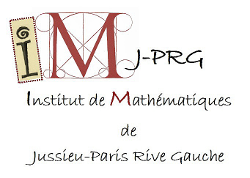| Résume | Ran Azouri
Title: Motivic invariants and singularities of schemes
Abstract: The structure of the motivic stable homotopy category produces invariants for schemes of a quadratic nature, such as an Euler characteristic defined in quadratic forms, and Euler classes defined in cohomology theories that contain quadratic information. We will present some results on those invariants, refining classical formulas in integers. Then we turn to invariants related to degenerations using motivic nearby cycles, concluding in a quadratic conductor formula.
Victoria Callet
Title: Topological modeling for music classification
Abstract : Persistent homology is a computational tool created at the end of the 20th century for applied algebraic topology. The main idea is to understand the topological structure of a starting object by progressive approximations: for this we use simplicial theory and more precisely simplicial complex and homology, which we will quickly recall at the beginning. In practice, we extract a point cloud from our initial object and transform it into a filtered simplicial complex using a method called the Vietoris-Rips filtration. Persistent homology then encodes the evolution of homology classes and more precisely their lifetime during the newly created filtration: we will represent all this information on a family of graphs called barcodes, from which we will be able to analyze and compare further starting objects. We call this process Topological Data Analysis. As an illustration, we will see how this process can be applied to the classification of musical styles using the Discrete Fourier Transform.
Sylvain Douteau
Titre : Weighted distances and topologies on Ran spaces.
Abstract : Given a Riemanian manifold M, its Ran space is a stratified space containing all finite configurations of points in M. Its strata, which are configuration spaces of some given cardinality, have been extensively studied, and the space itself is central in factorization homology. Yet, there is some ambiguity on the topology that one should consider on Ran(M). On one hand, there is the weak-topology, obtained by considering Ran(M) as the colimit of its truncation to configurations of bounded cardinal. While extremely natural, this topology is hard to describe. On the other hand, Ran(M) inherits a metric from M, called the Hausdorff distance, which induces another, coarser, topology. In this talk, I will present new topologies on Ran(M), induced from weighted distances which I will introduce. They interpolate between the weak topology and the Hausdorff topology, and collectively allow for a more explicit description of the weak topology.
Organisation : Christian Ausoni, Geoffroy Horel, Najib Idrissi, Muriel Livernet |

